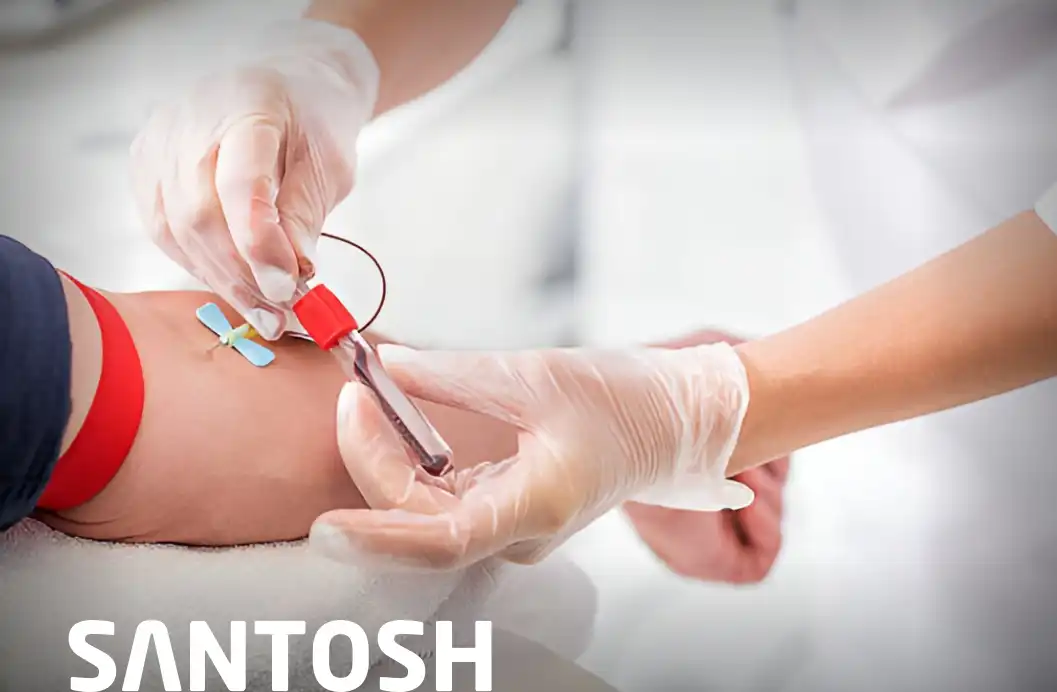Overview
The MD program in Immunohematology and Blood Transfusion from Santosh Deemed To Be University, located in Ghaziabad, offers a comprehensive and specialized curriculum for medical professionals interested in this field. This program provides in-depth knowledge and practical skills in areas such as blood transfusion, immunology, and clinical pathology.Students enrolled in the MD program will benefit from the expertise of renowned faculty members, access to state-of-the-art facilities, and a research-oriented environment. The curriculum emphasizes theoretical concepts, hands-on laboratory training, and clinical rotations, enabling students to develop a deep understanding of immunohematology and blood transfusion practices.Through this program, students gain proficiency in conducting blood group serology, cross-matching, blood component preparation, and management of various transfusion-related complications. They also learn about emerging trends in the field, including advanced techniques in molecular diagnostics and immunogenetics.
Upon completion of the MD program, graduates are well-equipped to pursue careers as skilled professionals in transfusion medicine, academic research, healthcare administration, or pursue further specialization through fellowship programs. The MD program in Immunohematology and Blood Transfusion from Santosh Deemed To Be University opens doors to a rewarding and impactful career in this vital medical discipline.
Eligibility criteria: MBBS with NEET qualification
Curriculum
Predominant in the cognitive domain are:
- Organisation of Transfusion Services/ Blood donation centre
- Acquire knowledge of the clinical, socio-behavioural, and fundamental biomedical sciences relevant to effectively and ethically provide medical supervision to operate blood donor centres and/or blood transfusion laboratories
- Acquire knowledge on blood donors - selection, donation, and testing, including process of allogeneic blood donation, including the medical history, donation process, adverse effects, and donor testing
- Identify appropriate laboratory screening investigations for blood donors, including interpreting virology and microbiology test results
- Be able to identify relevant scientific information to advise on introduction and implementation of new screening options for blood donors and donations
- Acquire knowledge of good manufacturing practice (GMP) with respect to processing blood donations and the manufacture and distribution of blood components, products, plasma derivatives, recombinant products and alternatives
- Acquire knowledge on equipment procurement, maintenance, performance, calibration, QC procedures, related to Transfusion Medicine
- Acquire knowledge on the establishment of rare blood group registry
- Acquire competence to use apheresis technology for apheresis donations and for therapeutic purposes like plasma exchange, red cell exchange, stem cell collections, granulocyte apheresis
- Acquire competence regarding ethical practices and the process of confidentiality – both patient and donor confidentiality
Transfusion transmitted infections:
- Acquire competence on appropriate strategies for blood safety with emphasis on TTI testing
- Be able to provide advice on the implementation of enhanced technologies for blood safety including NAT, Pathogen inactivation technologies
Immunohematology:
- Acquire competence to evaluate data, interpret and resolve discrepant results in ABO/Rh blood grouping and pre-transfusion testing
- Be able to select appropriate investigative tools to resolve serological problems encountered during compatibility testing, including molecular and genetic testing and interpret them appropriately in the clinical context
- Acquire competence to provide immune-pharmacological evaluation and transfusion support to patient with disorders like thalassemia, Immune hemolytic anaemia, transfusion reactions, Abo mismatched transplants, exchange transfusions and intrauterine transfusions
- Be able to advise on the introduction of new diagnostic options in the immune- hematology laboratory
- Demonstrate knowledge of Granulocyte and platelet antigen system and antibodies and approach to the laboratory evaluation of patient with anti-red cell/anti-platelet/ anti granulocyte antibodies and their clinical implications
Clinical Transfusion therapy:
- Acquire competence to incorporate principles of blood safety and transfusion safety in all the processes in the blood centre
- Acquire competence to effectively manage blood inventory
- Acquire competence to implement principles of rational use of blood and patient blood management
- Acquire competence to investigate transfusion – induced reactions
- Acquire knowledge to Identify and plan transfusion requirements to support the various types of transplantation programs
- Acquire competence to provide transfusion support to cases with massive blood loss
Hematology:
- Acquire competence to evaluate a case of anaemia with the help of appropriate laboratory investigations in a logical and stepwise manner
- Acquire competence to evaluate a patient showing an abnormal bleeding tendency with the help of appropriate set of laboratory investigations in a logical and stepwise manner
- Acquire competence to evaluate a patient with suspected leukaemia /bone marrow failure syndrome with the help of appropriate a battery of laboratory investigations in a logical and stepwise manner
- Acquire knowledge on the role of various diagnostic modalities including interpretation of Hemogram, Bone marrow aspirate and biopsy, screening and specialised coagulation tests, Hb electrophoresis and HPLC, flow cytometry, genetic tests like karyotyping and FISH in the diagnosis of various haematological disorders
Molecular diagnostics:
- Acquire knowledge of the science of molecular genetics, including nucleic acid structure and function, mutations/variations, and use appropriate/accurate descriptive nomenclature
- Acquire knowledge of standard molecular laboratory techniques
- Acquire technical proficiency in nucleic acid extraction, electrophoresis, qualitative and quantitative amplification technologies
- Be able to understand the clinical implications, methodology and limitations of testing for a wide range of clinical disorders, including malignant and non-malignant hemopoietic disorders, infectious diseases, coagulopathies, and inherited genetic disorders
Histocompatibility:
- Acquire competence to interpret the basic HLA testing procedures including HLA typing and cross-match
- Acquire working proficiency of the principle, workflow, instrumentation and troubleshooting of technologies commonly used in histocompatibility laboratories including molecular techniques like PCR, SSP and SSOP for HLA typing and cross- matching by CDC and flow cytometry
- Acquire familiarity with Luminex based assays, Sanger sequencing, NGS and fragment analysis
- Be competent to explain and discuss the implications of HLA matching and mismatches in solid organ and bone marrow/stem cell transplantation
- Be competent to discuss the factors involved in donor selection for bone marrow/solid organ transplantation
- Acquire competence to judiciously use available cross-matches and antibody detection tests in different clinical scenarios
- Acquire knowledge and be able to describe the role of the HLA system as it pertains to transplantation, the methods to select potential donors and recipients, and the role and function of various stem cell donor registries
- Acquire knowledge and competence to understand the HLA associations with disease
- Acquire knowledge of the policies and procedures regarding the collection and storage of hematopoietic stem cells from various sources
- Acquire an understanding of relevant issues regarding solid organ procurement and transplantation
Information management, automation, and regulatory systems:
- Apply the knowledge of applicable and relevant regulatory requirements in terms of documentation, process control for the functioning of blood centre
- Comply with the requirements of licensing, regulatory and accreditation bodies
- Assess the need for automation, evaluate and implement automation optimally for various activities at the blood centre
- Acquire knowledge and be able to apply the principles of quality management system, quality control and quality assurance at all levels of functioning at the blood centre and for all the activities
- Acquire knowledge of basic principles of laboratory management, including QC, QA, test validation, budgeting, personnel requirements, regulatory agencies and requirements, ethical issues, and laboratory and patient safety
- Acquire knowledge and be able to manage the operations of blood bank information system for effective data management with appropriate integration of informatics into the testing laboratories ensuring data protection
Predominant in the affective domain:
Affective Domain:
- Should be able to function as a part of a team, develop an attitude of cooperation with colleagues, and interact with the patient and the clinician or other colleagues to provide the best possible diagnosis or opinion
- Always adopt ethical principles and maintain proper etiquette in dealings with patients, relatives and other health personnel and to respect the rights of the patient including the right to information and second opinion
- Develop communication skills to word reports and professional opinion as well as to interact with patients, relatives, peers and paramedical staff, and for effective teaching
Predominant in the Psychomotor domain:
The student should be able to perform the following:
- Immunohematology
- ABO and Rh D blood grouping - forward and reverse grouping by tube method and by gel card and other methods
- preparation of cell suspensions of appropriate concentration following cell washing techniques, correctly, grade and interpret antibody-antigen reactions according to the established criteria
- interpret and resolve discrepant results in pre-transfusion testing, ABO/RhD grouping, red cell antibody screen, and antibody identification
- cross match by conventional tube method and other advanced technologies of blood components as per department SOP
- Perform direct and indirect antiglobulin test on appropriate specimens, grading and recording the results appropriately with the appropriate controls and "check cells"
- Perform trouble shoot in Antiglobulin testing by identifying sources of error in antiglobulin testing and resolve the errors in testing
- Perform antibody identification procedures by the use pf appropriate red cell panels and correctly interpret the results
- Identification of clinically significant RBC antibodies from an antibody panel including multiple alloantibodies and mixtures of alloantibodies and autoantibodies; determine how difficult it will be to obtain blood for this patient, and effectively communicate these results to clinicians
- Perform various immune-hematological tests including:
- Titration of Anti D and Anti A and Anti B
- Elution
- Adsorption
- Minor blood group typing
- Saliva Inhibition Test
- Resolution of ABO discrepancy and interpret them
- Preparation of appropriate reagents required for the specialized tests performed in Immunohematology lab, e.g.,
- Reagents required for Elution testing
- Reagents required for DTT treatment
- Reagents required for the Enzyme treatment
- Be able to select suitable unit/s of blood for a patient with autoimmune haemolytic anaemia
- Perform Quality Control tests for immunohematology reagents and interpret the results thereof
- Perform appropriate tests for transfusion reactions, evaluate them and recommend treatment plans for management
- Conduct evaluation for irregular antibodies that are clinically significant in pregnancy and make appropriate recommendations for blood component transfusion
Transfusion transmissible Infections:
- Perform blood donor screening tests for transfusion-transmissible infections (TTIs) as per departmental SOP
- Preparation and interpretation of Levey-Jennings (LJ) Chart and root cause analysis (RCA) and Corrective and Preventive action (CAPA) as and when required
- Perform non-treponemal and treponemal antibody tests for diagnose of syphilis and interpret the data
- Acquire competence for proper handling and disposal of biohazardous material as per regulatory requirements
- Perform Gram staining of biological fluids
- Perform Quality control testing of reagents and kits used for serological tests
- Perform peripheral blood smear staining and identification of malarial parasite
- Perform screening for malaria by various testing methods
Blood donation:
- Perform Hb estimation by various methods including Spectrophotometric and colorimetric techniques
- Organise outdoor blood donation camps
- Motivate blood donors / organizers for blood donation
- Conduct donor screening based on eligibility criteria for whole blood donation and apheresis donation
- Collect whole blood for preparation of blood components for transfusion
- Prepare the phlebotomy site
- Evaluate and manage adverse reactions associated with blood donation
- Perform biomedical waste disposal as per protocols
- Prepare blood components such as PRBC, FFP, Platelet concentrate and cryoprecipitate by centrifugation technique and by buffy coat technique
- Perform Quality Control (QC) on the blood components and take corrective action to rectify failure of QC
- Conduct Apheresis procedures like plateletpheresis and plasmapheresis
Hematology:
- Perform Hb estimation by various methods and interpret the complete hemogram
- Prepare stained peripheral blood smear and interpret disease conditions like nutritional (Iron deficiency/Vit B12 and Folic acid deficiency) anemia, Haemolytic anaemia (Immune, Sickle Cell, Thalassemia, Microangiopathic), acute and chronic leukaemia, identification of Hemoparasites
- Perform coagulation tests like prothrombin time, activated partial thromboplastin time (APTT), fibrinogen assay, thrombin time, mixing tests of PT and APTT, factor assays and interpret the results
- Perform point-of-care testing for hemostasis including ROTEM/TEG and interpret the data
- Interpret Hb electrophoresis data
Molecular diagnosis and HLA typing:
- Perform basic molecular laboratory techniques, such as nucleic acid extraction, both manual and automated, and techniques for quality assessment of DNA and troubleshoot in the event of a technical problem
- Interpret the results of various tests of HLA typing
- interpret data of HLA cross-matching and HLA antibody detection assays, both by cell based and solid phase methods
Team

Dr. Mayurika S Tyagi
Professor & HOD

Dr. Sonu Jain
Professor

Dr. Rajeev Goel
Assistant Professor
Career Prospective
After completing the MD program in Immunohematology and Blood Transfusion from Santosh Deemed To Be University in Ghaziabad, you can look forward to promising career prospects. With this specialized degree, you can explore various opportunities in the field of healthcare and research. Some potential career paths include:
- Clinical Hematologist: You can work as a hematologist in hospitals, clinics, or blood banks, diagnosing and treating patients with blood disorders and providing transfusion services.
- Transfusion Medicine Specialist: Become an expert in transfusion medicine, overseeing blood banks, ensuring safe blood transfusion practices, and managing blood-related complications.
- Research Scientist: Pursue a career in research, conducting studies and experiments to advance knowledge in immunohematology, blood transfusion, and related fields. You can work in academic institutions, pharmaceutical companies, or research organizations.
- Academic: Join educational institutions as a professor or lecturer, sharing your expertise in immunohematology and blood transfusion with aspiring medical students.
- Public Health Specialist: Contribute to public health initiatives by working with government agencies, non-profit organizations, or international health organizations, focusing on blood safety, transfusion guidelines, and public awareness.
- Quality Assurance Manager: Ensure compliance with quality standards and regulatory requirements in blood banks and transfusion services, maintaining safety and efficiency in blood transfusion practices.
- Consultant or Advisor: Offer your specialized knowledge and guidance as a consultant or advisor to healthcare institutions, organizations, or governmental bodies involved in transfusion medicine.
